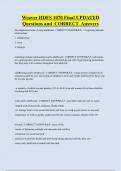Weaver HDFS 1070 Final UPDATED
Questions and CORRECT Answers
Developmental tasks of early adulthood - CORRECT ANSWER✔✔- 1. Exploring Intimate
relationships
2. childbearing
3. work
4. lifestyle
exploring intimate relationships (early adulthood) - CORRECT ANSWER✔✔- individuals
are exploring their options with intimate relationships and often begin forming partnerships
that they hope will continue throughout their adult life
childbearing (early adulthood) - CORRECT ANSWER✔✔- a large portion of adult life its
oriented around the care and raising of children in early and middle adulthood for those who
do become parents.
- a majority of adults become parents, 18% fo 40-44 year old women do not have children
(meaning that t82% do)
work (early adulthood) - CORRECT ANSWER✔✔- -paid labor and one's job or career
-unpaid work (housework, childcare, family work)
-we arrange what we do around the hours and time we work in jobs where we are paid
-importance of work is greatly underscored by the recent economic climate of the US
lifestyle - CORRECT ANSWER✔✔- -pace of life
-means of balancing multiple role demands and conflicts
-formation of a social network
-practices to promote health and well-being (sleep, physical activity, diet, etc)
-many early adults have trouble with this task
,five factors influencing job/career choice - CORRECT ANSWER✔✔- 1. Demographic
factors (race, ethnicity, gender, education)
2. Identity development (individuation, experiences
3. Social, political, historical context (economy, occupational pattern, governmental policies
and programs
4. Relational contexts (family, peers, mentors, school, teachers)
5. Individual characteristics (skills, competencies, interests, beliefs, self efficacy, motivation
,values, aspirations)
how does gender influence opportunities and occupational and educational experiences? -
CORRECT ANSWER✔✔- - Predetermined stereotype occupations for genders (Less women
in STEM, more as nurses men take on more physical labor jobs, lower percentage of male
nurses)
- Negative stereotypes can negatively affect performance (Stereotype that girls are worse at
math, Implicit bias, Workplace culture)
what is the main focus of super's rainbow? - CORRECT ANSWER✔✔- -sequence of career
development in adulthood
-combination and sequence of roles played by a person during the course of a lifetime
three broad areas of focus (rainbow) - CORRECT ANSWER✔✔- 1. DEVELOPMENTAL
--a life span focus with a career model of development that contains stages occurring in a
sequence with each having stage appropriate developmental tasks. Further, career
development is a continuous process.
2. EXPERIENTIAL
--a social emotional focus that incorporates consideration of self-concept in career
experiences. That is, career decisions and behavior are based on one's own sense of self
including what one thinks about one's own abilities, skills, and attributes.
, 3. CONTEXTUAL
--a focus that considers both the complete person and their position in society. In his later
reformulations, Super proposed that work is one of many roles people experience over a
lifetime and that it is important to understand the interrelationships among these as well as
how these various roles emerge and re-emerge at various points across the life span. Further,
one's career trajectory initially begins with one's location within society through parental
socio-economic level and then shaped by individual personality traits, abilities, and
opportunities.
consensual validation - CORRECT ANSWER✔✔- our own attitudes and values are
supported when someone else's are similar to ours
familiarity - CORRECT ANSWER✔✔- necessary for close relationship development, being
around each other
similarity theories of attraction - CORRECT ANSWER✔✔- we are attracted to people like us
(race, religion, sports, area)
- we are attracted to those with personalities similar to our parents and those with
appearances similar to a sibling or opposite sex parent
what is considered to matter when considering if adult or not? what does not seem to matter
(Arnett) - CORRECT ANSWER✔✔- Matter:
1.) responsibility- being responsible for consequences of actions
2.) values and beliefs- deciding on one's values and beliefs
3.) financial independence - being able to support oneself
doesn't really matter:
-role transitions
what is emerging adulthood? - CORRECT ANSWER✔✔- a stage between adolescence and
early adulthood




